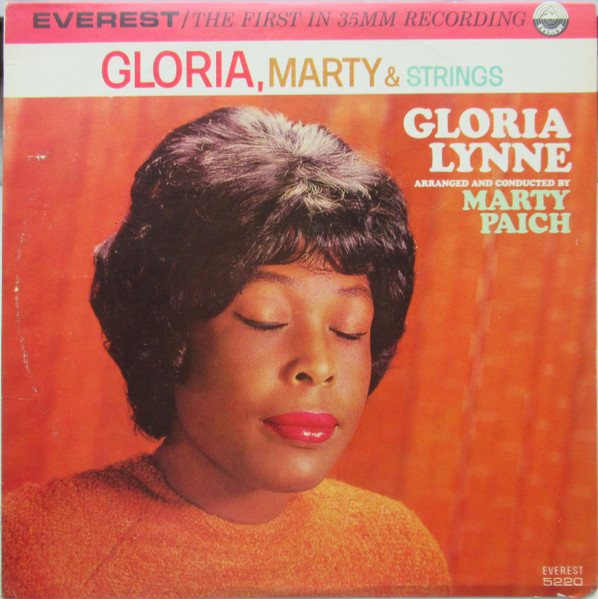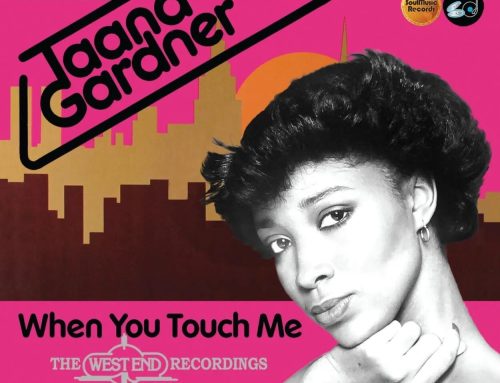Gloria Lynne & The Women Of Jazz
By Glenda Gracia
When I was twelve, my mother taught me how to clean our house. She also taught me about the women of jazz, since that was the only music I could listen to while I was cleaning. No Motown. No Stax. No Atlantic. No Imperial. Just jazz. So, I found myself making the best of it to capture my allowance.
Then, I heard I’m Glad There Is You by Gloria Lynne.
As I cleaned to these lyrics week after week – I began to actually believe that this was the way love was supposed to be: “In this world of ordinary people, extraordinary people, I’m glad there is you.”
Mind you, I wasn’t altogether sure what those lyrics meant for real. However, my suspicions were that there was something sacred about being in relationship, especially a relationship that was soul deep. I was always precocious. It got me in trouble.
As my hormones raged and I was becoming, I truly longed to know what it meant to “…live to love, … to love to live with you, beside me. This role so new, I’ll muddle through, with you to guide me.”
Having boyfriends was never an issue. But, “…in this world where many, many play at love, and hardly any stay in love…” – to be able to say to someone, “I’m glad there is you more than ever, I’m glad there is you…” What could I be getting myself into?
I learned about puppy love the hard way: boys would lie to get some and have more than one girlfriend at a time. Today, this is celebrated as polyamory. Only you don’t have to lie. You merely have to be bold and not have STD’s. When I was young, I thought you just had to wait by the phone…
Black women in the fifties and sixties were truly glamorous. And, my mother was no exception. She had this tight-fitting, sexy, persimmon colored t-strap dress that sparkled and could only be called slinky. How those rhinestones were embedded in that dress I’ll never know – but there they were, right down to the hemline. It was hot! And, when she wore it – she changed into a glamour queen, matching her bangles and earrings to the color of her dress. It was almost as if Marilyn Monroe had possessed her.
When she put that dress on – I knew a serious grown up party night was brewing. To make sure she was in the mood, she would play Lynne’s hit I Wish You Love – loud and on repeat! I was in charge of the repeat part. I would sit there, beguiled, while she got her make-up just right. As she applied her lipstick, I was imagining the slow, low swaying dance that she would have with my father later at the party to that very song. Maybe her lipstick would brush upon his collar as he held her close. They really loved each other.
By the time I was 16, I had my own car, and two girlfriends who were equally rabid about Lynne. Our fantasies of teenage love were made clearer when we would steal hard liquor from one of their parent’s liquor cabinets, sneak up to the attic of her house, listen to these song-tales, write poetry, talk shit, and daydream about the boys we wanted.
Gloria, Marty & Strings was simply the best album ever. The three of us had learned her version of Folks Who Live on The Hill and sang along completely out of tune, as we got tipsy together. This depiction was our true fantasy of what growing old together meant in this dreamy version of love everlasting. “Darby and Joan who used to be Jack and Jill… The folks who liked to be called what they have always been called… the folks who live on the hill.”
Since I still had a lot more years of cleaning the house left, I ventured out and became semi-fanatical about the genre, plumbing my parents’ jazz collection finding Nancy Wilson, Betty Carter, Carmen McRae, Sarah Vaughan, and Dinah Washington.
“When a bee lies sleepin’” is arguably the perfect jazz duet between Nancy Wilson and Cannonball Adderley. It could also be labeled the perfect approach to love by teenage girls: “he’s mine for the takin’, i’m so happy at last.” That’s what would happen. Teenage girls would gather around teenage boys, pretending not to be paying attention. All the while, plotting who we would sting with the kiss that would seal the deal.
My later life somehow magically included adventures with these women in real time. I was developing a project with Nancy Wilson. Had Thanksgiving dinner with Betty Carter. Walked Carmen McCrae back to her hotel room after a glorious performance at the Rainbow Room in New York. Snuck into a Philly nightclub as an underage patron to see Dinah Washington.
However, it was that jaw-dropping call from Gloria Lynne that trumped everything. Over chicken and waffles in Harlem, she asked me to manage her. It broke my heart to say no to this icon who had become my childhood guru for love. Yet, I was up to my eyeballs with a busy roster and simply did not have the bandwidth. I almost fawned over her as she chatted with me about her life in the business in a humble, polite and soft–spoken tone. She could tell from the tears in my eyes that I was deeply touched by her request and truly saddened by not being able to manage her at that time.
These women of jazz were the harbingers of something monumentally defining in my life. In 1982, I became Phyllis Hyman’s manager. I had the knowing upon meeting Phyllis in 1976 that she was the new vanguard of the jazz women.
Phyllis had said it herself, “If you can’t sing like Nancy Wilson, you don’t need to be in the business.”
She was right. Nancy Wilson was the bar against which Phyllis measured herself, eventually earning her way into the inner sanctum of the jazz women. The acclaim for her Tony nominated role in Broadway’s Sophisticated Ladies proved it, along with other recorded guest appearances with jazz masters from McCoy Tyner to Grover Washington, Jr.
By the time I managed Phyllis, I was intimately familiar with the legacy she was carrying and looked forward to supporting her new vision of what that legacy could look like.
Phyllis also had the favor returned by Nancy Wilson, who, with no hesitation at all, claimed, “She was a rare beauty, and in my estimation one of the great voices of our time.”
How could my twelve-year old self ever know that listening to those voices while dusting furniture would one day prepare me for adventures with the women of jazz in real-time. As I mentioned, I was always precocious. It got me in trouble.
Glenda Gracia, Executrix, the estate of Phyllis Hyman
https://www.facebook.com/glend.gracia.12
SoulMusic.com founder David Nathan’s note: Gloria Lynne (1929-2013) began recording in 1954, with some 25 albums to her credit. Her biggest hit single was with “I Wish You Love” in 1964; in her last two decades, she received long overdue recognition as an influential song stylist: New York City proclaimed the Harlem-born entertainer July 25, 1995 as “Gloria Lynne Day.” In 1996, she received the International Women of Jazz Award and she was honored with a Pioneer Award by the Rhythm and Blues Foundation in 1997. Other awards and recognition included induction into the National Black Sports and Entertainment Hall of Fame; Living Legend Award from the State of Pennsylvania (2007) and in 2008, a special award for “Outstanding Achievement In Jazz”, at the New York MAC Awards. On October 22, 2010, Gloria was honored at New York’s Schomburg Library, for her many contributions to the music industry and the world by Great Women In Music and its founder Roz Nixon.
“Perspectives” (c) 2022, SoulMusic.com, All Rights Reserved






